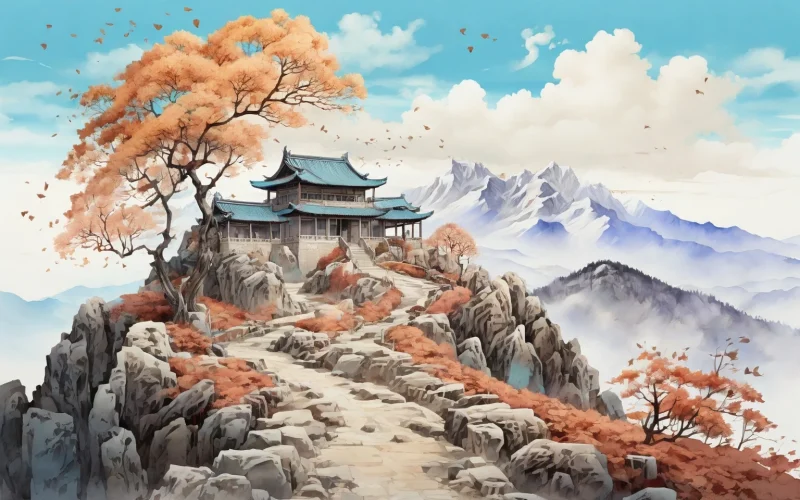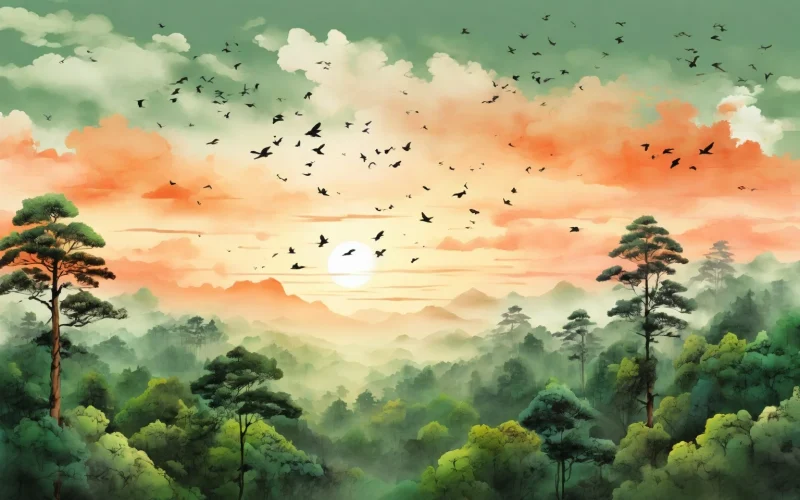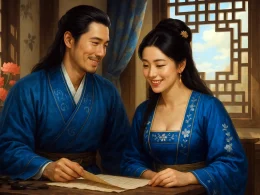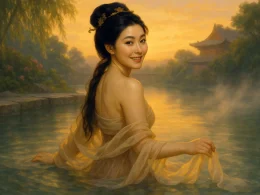I do not hope to earn good wages;
To do farm work is all my due.
My folks have tilled the field for ages;
Hunger and cold are nothing new.
I never ask more than enough,
Satisfied with chaff and plain food,
Clad in winter clothes of poor stuff
And in summer garment not so good.
I cannot meet my humble need.
How sad to say with broken heart!
Others may thrive in word or deed,
I can't earn a living apart.
What can I do and how can I
Drown my grief but drink my cup dry!
Original Poem
「杂诗 · 其八」
陶渊明
代耕本非望,所业在田桑。
躬耕未曾替,寒馁常糟糠。
岂期过满腹,但愿饱粳粮。
御冬足大布,粗絺以应阳。
正尔不能得,哀哉亦可伤!
人皆尽获宜,拙生失其方。
理也可奈何,且为陶一觞。
Interpretation
Miscellaneous Poems VIII was composed around 414 AD during Tao Yuanming's impoverished life after resigning from officialdom. Though having resolutely returned to farming, he suffered perennial hunger and destitution. Facing such hardships, he remained steadfast in his convictions, using poetry to express his rejection of official career and commitment to personal freedom. While vividly depicting poverty, the poem maintains an unyielding dignity, permeated with stubborn optimism that refuses to succumb to fate.
First Couplet: "代耕本非望,所业在田桑。"
Dài gēng běn fēi wàng, suǒ yè zài tián sāng.
Farming for others was never my aim,
My calling lies in field and silkworm's frame.
Declares his rejection of official livelihood, embracing farming as his true vocation, demonstrating his commitment to reclusive integrity.
Second Couplet: "躬耕未曾替,寒馁常糟糠。"
Gōng gēng wèi céng tì, hán něi cháng zāo kāng.
Never ceasing hands-on toil,
Hungry and cold, just chaff and bran my meal.
Portrays life's hardships, highlighting unrelenting labor yielding meager returns, yet leaving his resolve unchanged.
Third Couplet: "岂期过满腹,但愿饱粳粮。"
Qǐ qī guò mǎn fù, dàn yuàn bǎo jīng liáng.
Never expecting belly's fill,
Just hoping for refined grain's thrill.
Simple desires underscore extreme poverty, where even basic needs remain unfulfilled.
Fourth Couplet: "御冬足大布,粗絺以应阳。"
Yù dōng zú dà bù, cū chī yǐ yìng yáng.
Coarse cloth for winter's freeze,
Hemp rags for summer's ease.
Minimal clothing requirements reflect destitution, yet still barely met.
Fifth Couplet: "正尔不能得,哀哉亦可伤!"
Zhèng ěr bù néng dé, āi zāi yì kě shāng!
When even this proves vain,
Alas! What bitter pain!
Tone shifts from calm to lament, sighing at fate while hinting at social injustice.
Sixth Couplet: "人皆尽获宜,拙生失其方。"
Rén jiē jìn huò yí, zhuō shēng shī qí fāng.
All others find their proper place,
While my clumsy life lacks grace.
Contrast with others' success highlights his nonconformist isolation in society.
Seventh Couplet: "理也可奈何,且为陶一觞。"
Lǐ yě kě nài hé, qiě wèi Táo yī shāng.
What logic can explain?
Just pour this Tao his wine!
Concludes with self-referential drinking - impoverished yet unchanged in spirit, demonstrating transcendent defiance.
Holistic Appreciation
This poem depicts Tao's impoverished post-reclusion life while preserving his self-respect. The opening establishes his farming vocation as antithesis to official ambition, a stance maintained throughout. Middle couplets use unadorned language to portray hunger and cold with poignant authenticity yet without complaint. Descriptions of minimal clothing needs emphasize his modest expectations still unmet. The finale shifts from sorrow to self-mocking wine consolation, resolving hardship with humor that reveals his noble, unyielding character.
Artistic Merits
The poem's language approaches colloquial simplicity yet conveys profound emotion and lofty ideals. Structurally, it progresses from ideals to reality, then emotion to philosophical resolution. Skillful contrasts like others' success versus his displacement ("clumsy life") create pathos without self-pity. Most characteristic is the self-referential wine line - seemingly plain yet infinitely suggestive, blending self-mockery with dignity, perfectly embodying his spiritual independence.
Insights
This final poem of the series teaches that while adversity is inevitable, holding true to one's convictions can sustain joy even in destitution. Tao's choice of honorable poverty over compromised prosperity, and his wine-inspired self-consolation, demonstrate unyielding personal integrity. In our rapidly changing society, his spirit of "accepting what cannot be changed" remains profoundly relevant for contemplation and emulation.
Poem translator
Xu Yuanchong (许渊冲)
About the poet

Tao Yuanming(陶渊明), 365 – 427 CE, was a poet, literary figure, fu writer, and essayist active during the late Eastern Jin and early Liu Song dynasties. Born in Chaisang (near present-day Jiujiang, Jiangxi Province), he pioneered a new genre of pastoral-themed literature, expressing profound philosophical insights through simple language. His poetic style became an enduring aesthetic standard in classical Chinese poetry.











